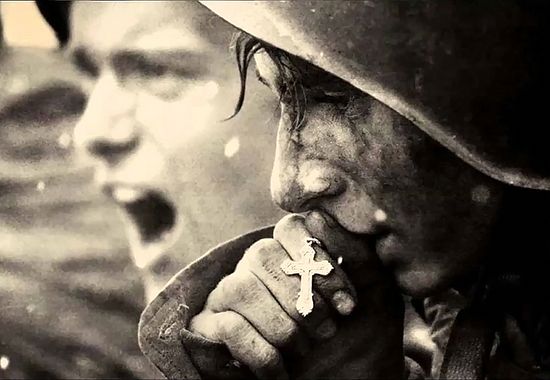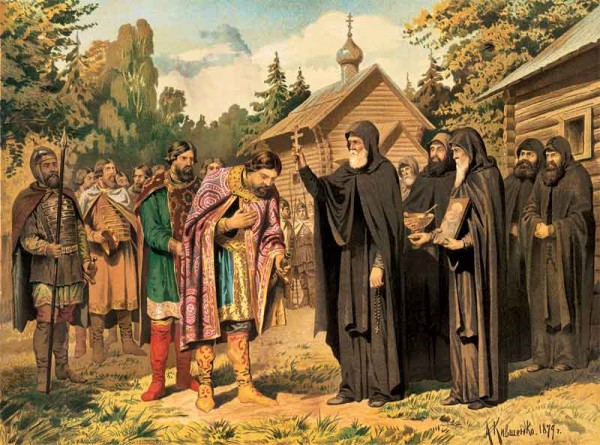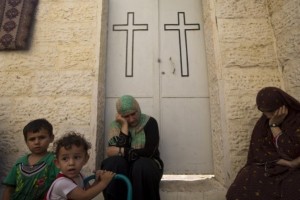Eastern Christianity does not view morality in fundamentally legal terms or within the context of abstract philosophy, but as part of the holistic vocation of humanity for theosis: participation by grace in the eternal life of the Holy Trinity. Hence, the Orthodox vision must be considered on its own terms, and not distorted by the imposition of Western categories. The question for the Orthodox is not, “What approach to warfare is most persuasive rationally or incumbent upon all Christians as a matter of moral law?” Instead, the East asks, “In light of the human vocation for growth in holiness and communion with God, how should Christians respond to the prospect of warfare?”
The prominence of petitions for peace in the Liturgy sheds light on the Orthodox response to war. Since the Church believes that the Liturgy is a participation in the worship of heaven, and grounds the knowledge of God in worship and mystical experience, it is fitting to place the issue of war and peace within the context of the liturgical life of Eastern Christianity, for it is in worship that the Church participates most fully in communion with the Holy Trinity.
In the Divine Liturgy of St. John Chrysostom, the first petitions of the Great Ektenia are for “the peace from above, and for the salvation of our souls” and “the peace of the whole world; for the good estate of the churches of God, and for the union of all.” At every Liturgy we pray for our parish, the clergy and laity, for government officials and all those in public service, for the place we live and for all towns and cities, for peaceful times, for travelers, the sick, the suffering, for captives and their salvation, and for our deliverance from all tribulation, wrath, danger, and need. “Help us; save us; have mercy on us, and keep us, O God, by Your grace,” we beg, finally commending “ourselves and each other, and all our life unto Christ our God.”
These are not simply decorative words. Neither are they prayers which refer merely to the inner tranquility of worshipers, nor to an entirely future Kingdom of Heaven. Instead, they embody an Orthodox vision of salvation and call upon the Lord to enable us to experience his heavenly peace right now in every dimension of life: personal, public, religious, temporal, and political. Whoever prays these prayers is asking already to participate in the Kingdom of God on earth, to find the healing and blessing of salvation in every dimension of one’s life indeed, in every aspect of God’s creation.
The entire Liturgy is an epiphany of God’s Kingdom on earth. The priest begins the service with a proclamation, “Blessed is the Kingdom of the Father, and of the Son, and of the Holy Spirit: now and ever and unto ages of ages,” which declares that the assembly is now participating in the worship of Heaven. The Church is raised to the life of the Kingdom as her members gather to glorify and commune with the Holy Trinity.
Because we believe in the Incarnation and the goodness of God’s physical creation, we pray for peace and salvation upon people in “real life” situations of peril and suffering, for deliverance from the kinds of calamities and hardships that beset our mortal bodies in this life.
The peace for which we pray includes every dimension of our existence before the Lord. God created us for communion with Himself in all aspects of our personhood: body, soul, and spirit. Christian salvation entails the resurrection of the complete, embodied self in the blessed communion of Heaven and the transformation of the entire creation in subjection to the Holy Trinity.
The peace for which we pray is our participation in that all-inclusive salvation. There is no true peace other than that found in the healing and transformation brought to human beings by the God-Man in whom our humanity is united with divinity. Since God intends to save us in every dimension of our existence, his healing concerns the full range of human life. Even as bread and wine become the means of our communion with the Lord, we are to offer every bit of ourselves and of this world to the Father in union with the sacrifice of the Son by the power of the Holy Spirit. We will then find life-giving communion with the Holy Trinity in everything we say and do; our life will become a eucharistic offering as we grow in holiness and union with God.
If the Liturgy is a participation in the eschatological peace of the Kingdom of God, it is fair to ask whether the members of the Church recognize and live out this vision of heavenly peace. An immediate note of realism comes to mind, as the members of the Church are sinners who have not manifested fully the new life of Christ. Nonetheless, the presence of the Holy Spirit enables the Church to embody a foretaste of the eschatological peace of the Kingdom of Heaven, and there is much in the history and ongoing life of the Church which witnesses to the saving peace of God here and now.
Though there is some ambiguity in the Church’s teaching on Christian participation in war, the Orthodox vision of peace prizes selfless love and forgiveness over violence, viewing war, in some situations, as a lesser evil with damaging spiritual consequences for all involved.
In contrast with Orthodoxy, it is easier to describe the traditional Western Christian justifications of war, which have included both the granting of plenary indulgences to those who fought in the crusades and the affirmation of a just-war theory. The former envisioned the killing of infidels as such a righteous act that the crusaders were released from all temporal punishments for their sins, including exemption from purgatory. The latter, which has been widely influential in Western culture, provides moral sanction to wars which meet certain philosophical criteria.
Orthodoxy has never embraced the crusade ethic. Orthodoxy has viewed war always as an evil, even if, as the theologian Olivier Clément expressed it, “The Church has accepted warfare sorrowfully as a sometimes necessary evil, but without concealing that it is an evil which must be avoided or limited as much as possible.” Elsewhere he notes, “The only normative ideal is that of peace, and hence the Orthodox Church has never made rules on the subject of ius belli and of ius in bello.”
Canon 13 of St. Basil’s 92 Canonical Epistles states:
Our fathers did not consider killings committed in the course of wars to be classifiable as murders at all, on the score, it seems to me, of allowing a pardon to men fighting in defense of sobriety and piety. Perhaps, though, it might be advisable to refuse them communion for three years, on the ground that their hands are not clean.
Father John McGuckin observes that St. Basil refers to St. Athanasius as the father who wrote, in his “Letter to Amun,” that killing the enemy was legitimate in wartime. McGuckin argues, however, that St. Athanasius was advising Amun on the question of the sinfulness of nocturnal emissions. “In fact the original letter had nothing whatsoever to do with war… The military image is entirely incidental, and Athanasius in context merely uses it to illustrate his chief point in the letter,” which is to show that the moral significance of actions may not be discerned without reference to the contexts in which they occurred.
Against any simplistic readings of the letter as a blanket justification of killing in war, St. Basil places the issue in a specific context. As McGuckin writes on St. Basil in “War and Repentance,” “what he speaks about is the canonical regulation of war in which a Christian can engage and find canonical forgiveness for a canonically prohibited act…”
Killing in war had been forbidden completely in earlier canons, such as Canon 14 of Hippolytus in the fourth century, which states:
A Christian is not to become a soldier. A Christian must not become a soldier, unless he is compelled by a chief bearing the sword. He is not to burden himself with the sin of blood. But if he has shed blood, he is not to partake of the mysteries, unless he is purified by a punishment, tears, and wailing. He is not to come forward deceitfully but in the fear of God.
St. Basil distinguishes between outright murder and killing “for the defense of Christian borders from the ravages of pagan marauders.” By limiting fighting to such circumstances, he sought to “restrict the bloodshed to a necessary minimum.” In contrast to the lifelong exclusion from the sacraments imposed on murderers, St. Basil recommends three years of exclusion from the chalice, thus providing a public sign that the Gospel standard is violated by war.
The Christian soldier who has killed in war is to “undergo the cathartic experience of temporary return to the lifestyle of penance… Basil’s restriction of the time of penance to three years, seemingly harsh to us moderns, was actually a commonly recognized sign of merciful leniency in the ancient rule book of the early Church.” (It is not uncommon to meet veterans who are tormented for the rest of their lives by the horrors of war. I recall the father of a childhood friend who suffered from nightmares thirty years after the conclusion of his military service during World War II. Those who are trained to kill sometimes have difficulty returning to the mores of civilian life, not to mention the life of theosis.)
McGuckin concludes that this canon of St. Basil excludes the development of just war theory in Orthodoxy. Though particular wars may be necessary or unavoidable, they are never justified, as shedding the blood of other human beings is contradictory to the way of the Kingdom of God.
In his book, The Price of Prophecy, Fr. Alexander Webster agrees that a theory of justified war “has never been systematically elucidated in Orthodox moral theology.” He describes participation in such a war as “a lesser moral option than absolute pacifism, for those unwilling or unable to pay the full price of prophecy.” He suggests that Orthodox criteria for a just war include a “proper political ethos,” meaning that the nation going to war should follow “the natural-law ethic and have positive relations with the Orthodox community.” The war should also take place for the “defense of the People of God” from injustice, invasion, or oppression “by those hostile to the free exercise of the Orthodox faith.” A proper “spiritual intent” should also lead to “forgiveness and rehabilitation” of enemies as persons who bear the image of God, and not “mere revenge, self-righteousness, or conquest.” Webster states that
Whereas the pacifist seeks to emulate Jesus as the Good Shepherd who allowed Himself to be slain unjustly by and for sinners, the just warrior perceives a higher duty: to defend the relatively innocent from unjust aggression. If the Orthodox pacifist can never do anything evil even for a reasonably just end, the Orthodox warrior cannot preserve his personal holiness by allowing evil to triumph through his own inaction.
It is curious for Webster to suggest that the just warrior follows a “higher duty” than that of the pacifist, especially when the clear norm for the Church is the selfless, forgiving, nonresistant way of Christ. Likewise, the enumeration of moral categories for a justified war and the reference to governments which follow an ethic of natural law raise the question of whether this interpretation places questions of war and peace more within the context of human moral reasoning than in that of the journey to theosis. It is fair to ask whether Webster’s formulation gives sufficient attention to the spiritual vision of Orthodoxy, as opposed to the greater reliance on an ethics of human reason in Western Christianity.
Though Christlike response of “turning the other cheek” to assaults is the ideal, the Orthodox Church does not prescribe pacifism or nonviolence as an absolute requirement of the Christian life. The Church’s moral guidance serves the goal of theosis, of guiding the members of Christ’s Body to growth in holiness and union with the Trinity. The canons of the Church are applied pastorally in order to help particular people find salvation as they seek to be faithful in the given set of challenges and weaknesses which they face. The Church’s experience is that temporal authority and the use of force are necessary to restrain evil and promote good in our fallen world.
Though the witness of the early Church was largely, but not exclusively, pacifist, the Byzantine vision was of symphonia, or harmony, between God’s Kingdom and earthly realms. Hence, Christian emperors and armies fought wars and sustained a social order that sought to embody faithfulness to the Lord in all areas of life. Church and empire were to be united, in Webster’s words, “even as the divine and human natures of Christ are united in the One Person of the Incarnate Son of God.” In practice, however, that vision was never fully realized in Byzantium; human sinfulness corrupted its political and ecclesiastical leaders in many ways.
There have remained in Orthodoxy, however, indications of the ideal of peace. Monks and clergy, for example, may not bear arms and are forbidden to use deadly violence even in cases of self-defense. Canon V of St. Gregory of Nyssa “states that should a priest ‘fall into the defilement of murder even involuntarily (i.e., in self-defense), he will be deprived of the grace of the priesthood, which he will have profaned by this sacrilegious crime.’”
Those whose hands have shed blood are no longer the icons of Christ which priests are called to be, and are not suited to serve at the altar. As Webster writes in The Pacifist Option, “An Orthodox priest is supposed to be an exemplar for the Christian community, a man with a personal history free from all serious or grievous offenses including the taking of a human life for any reason.”
Even as the sacramental priesthood is a special vocation to which not all are called, the straightforward embodiment of Christlike, nonviolent love incumbent upon priests is not canonically required of all believers. In keeping with the practice of economia, the norm of nonresistant love may not be directly applicable to those whose vocations in our broken world require the defense of the innocent. These may grow in holiness by fighting as justly as possible, even as they mourn the harm done to themselves and others by their use of violence.
Whatever choices we make in our efforts to defend the innocent from attack and abuse, none are perfect. In a fallen world populated by sinful people, every Christian’s journey to the Kingdom will be marked by a measure of spiritual brokenness, and repentance is the only road to healing.
Particular countries and peoples have been so closely identified with the Orthodox faith that their defensive wars against Islamic invaders, though not Western-style crusades, have been described as “a difficult and painful defense of the Cross.” The appeal for “victory over their enemies” at the feast of the Exaltation of the Cross, and other instances of martial imagery in the liturgies, has at times been corrupted into a “national Messianism” in which a soldier who dies in battle is regarded as a martyr and the evil of war is forgotten.
It would be a mistake, however, to suggest that Orthodoxy has enthusiastically endorsed war. Even in cases of the defense of a Christian people from Islamic invasion, the spiritual gravity of warfare has not been forgotten. For example, St. Sergius of Radonezh in the fourteenth century gave his blessing to Grand Prince Dimitri to fight a defensive war against the Tatar Khan only after he received assurances that the prince had already exhausted every possible means of reconciliation.
Kutuzov’s strategy in response to Napoleon’s invasion was similar, abandoning Moscow to the French and merely harassing Napoleon’s forces during their withdrawal, having no other aim than to drive the invader back to the frontier.
Far from being examples of unbridled militarism, these are instances which reflect the reluctant acceptance of war at times as a necessary evil.
These notes of realism should not be allowed to obscure the Church’s insistence that “non-retribution, the avoidance of violence, the returning of good for evil … and the harmony of peoples” are a holistic “normative good which Christians must seek with God’s help,” in the words of Olivier Clément.
Fr. Stanley Harakas observes that “the Eastern Patristic tradition rarely praised war, and to my knowledge, almost never called it ‘just’ or a moral good…. The peace ideal continued to remain normative and no theoretical efforts were made to make conduct of war into a positive norm.”
The evidence for widespread pacifism in the Church is strongest before St. Constantine, when the Empire was pagan and Christians, including converts within the army, were persecuted for refusing to participate in the worship of false gods. Even after the Christianization of the Empire, with the eventual requirement that only Christians could be in the army, there remained teachers of pacifism in the Church, such as Pope St. Damasus, Prudentius, and St. Paulinus of Nola. Webster remarks that St. Paulinus, in the fifth century, was the last Church Father who explicitly addressed the moral issue of war from a pacifist perspective. From then on, pacifist sensibilities would manifest themselves in other contexts, such as the requirement of clerical and monastic nonresistance.
The contrast between the canonical requirement of pacifism for the clergy and the acceptance of military service by the laity requires further comment. Webster notes that the identification of clergy with the nonviolent norm and the allowance of participation in war on the part of the laity implies a two-tier ethic with a higher and a lower class of Christians, which could be taken to imply that the clergy are necessarily holier than the laity.
More faithful to Orthodox ecclesiology would be the affirmation that the norm now embodied by the clergy will at some future point become normative for all Orthodox. Here we are dealing with a point of eschatological tension that will be resolved in the Kingdom of Heaven, when all will be pacifists, for violence and other evils will be destroyed. In the present, as Webster writes in The Pacifist Option, the clergy are “expected to demonstrate the attainment of an advanced spiritual and moral state to which all Orthodox Christians are [ultimately] called.”
The recognition of pacifism as an ultimate norm or goal for all Christians should not be surprising. In the Sermon on the Mount, Jesus Christ calls His followers to theosis, to growth in holiness and perfection in union with God. “Be perfect, therefore, as your heavenly Father is perfect.” (Matt. 5:48) This teaching is the conclusion of a section focusing on the love of enemies, which is immediately preceded by the Lord’s repudiation of resistance against evil. “Do not resist an evildoer. But if anyone strikes you on the right cheek, turn the other also.” (5:39)
These passages indicate that the repudiation of violence in self-defense is a sign of growth in holiness. Our Lord’s example of offering Himself on the cross for our salvation is the paradigmatic epiphany of the selfless love in which human beings are to participate as they come to share by grace in the life of the Trinity.
Fr. Philip LeMasters is professor of Religion and director of the Honors Program at McMurry University in Abilene, Texas. A priest of the Antiochian Orthodox Archdiocese, he serves at St. Luke Orthodox Church in Abilene. This is an abridged version of a chapter in his book, The Goodness of God’s Creation (Regina Orthodox Press). The Patristic texts cited here and many others, plus essays by a number of Orthodox theologians, can be found in For the Peace from Above: An Orthodox Resource Book on War, Peace and Nationalism, Hildo Bos and Jim Forest, editors, Syndesmos, 1999. The full text of the book is posted on the OPF web site:http://incommunion.org/articles/for-the-peace-from-above/first-page





















